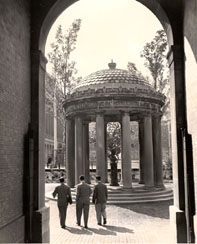Difference between revisions of "Taint Gate"
Stephen.wang (talk | contribs) |
Stephen.wang (talk | contribs) |
||
| Line 1: | Line 1: | ||
| − | [[Image:Taintgate.jpg|thumb|]] | + | [[Image:Taintgate.jpg|thumb|View of Van Am Quad from within the Taint]] |
The set of gates that encloses the open air corridor between [[Hartley]] and [[Wallach]] located at W. 115 Street and Amsterdam Avenue. The gates ensure that there is no street access to the [[Living Learning Center]] (LLC) during normal operation. These gates are rarely unlocked and are only opened for medical emergencies, new student move-in, and move-out. | The set of gates that encloses the open air corridor between [[Hartley]] and [[Wallach]] located at W. 115 Street and Amsterdam Avenue. The gates ensure that there is no street access to the [[Living Learning Center]] (LLC) during normal operation. These gates are rarely unlocked and are only opened for medical emergencies, new student move-in, and move-out. | ||
Although the reference is slightly vulgar, the "Taint Gate" is commonly used by facility directors and employees, and included in some university documents including, the Columbia University Emergency Medical Service Standard Operating Procedure.[http://www.columbia.edu/cu/cava/SOP.pdf] | Although the reference is slightly vulgar, the "Taint Gate" is commonly used by facility directors and employees, and included in some university documents including, the Columbia University Emergency Medical Service Standard Operating Procedure.[http://www.columbia.edu/cu/cava/SOP.pdf] | ||
Revision as of 01:09, 11 March 2007
The set of gates that encloses the open air corridor between Hartley and Wallach located at W. 115 Street and Amsterdam Avenue. The gates ensure that there is no street access to the Living Learning Center (LLC) during normal operation. These gates are rarely unlocked and are only opened for medical emergencies, new student move-in, and move-out.
Although the reference is slightly vulgar, the "Taint Gate" is commonly used by facility directors and employees, and included in some university documents including, the Columbia University Emergency Medical Service Standard Operating Procedure.[1]
